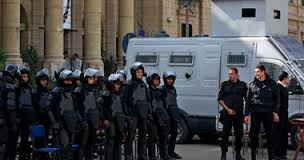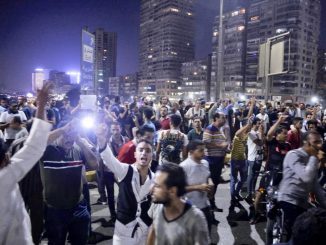
About ten days after Egypt’s Prosecutor-General Nabil Sadek’s meeting with Rome’s Chief Prosecutor Giuseppe Pignatone and Italian investigation team, leaks are still emerging on the developments of Italian Ph.D. Student Giulio Regeni’s murder in Egypt.
Giulio Regeni, the Ph.D. student who was doing postgraduate research into Egyptian trade unions, disappeared on the fifth anniversary of January Revolution.The Cambridge University student’s body was found brutally tortured in a roadside ditch on the outskirts of the Egyptian capital, on February 3, 2016. His mother said that she could only recognize him by his nose.
Torture found on Regeni’s body showed the signs of Egypt’s security forces which are known for using violence against detainees to gain information and confessions.
The Egyptian authorities have narrated several stories about the Italian student murder. They previously claimed he was killed in a traffic accident. Then, they claimed he was kidnapped and murdered by a gang specialized in killing foreigners. Four suspected men were shot dead by the Egyptian security forces.
Since Regeni’s murder, Italy has repeatedly expressed its dissent from the Egyptian authorities which have been accused of not cooperating to find those responsible for Regeni’s brutal death.
On June 30, the Italian Senate voted to halt supplies to Egypt of spare parts for F16 warplanes in protest against the killing of Italian student Giulio Regeni. Two months before the Italian Senate decision, Italy recalled the Italian ambassador from Egypt in light of the unresolved murder of the Italian Student.
Egypt’s Prosecutor General Nabil Sadek met with Rome’s Chief Prosecutor Giuseppe Pignatone
Leaks from the meeting between Egypt’s Prosecutor General Nabil Sadek and Rome’s Chief Prosecutor Giuseppe Pignatone and the Italian investigation team, which lasted for 36 hours, appeared intermittently through media reports by some Italian journalists especially in La Repubblica and Corriere de la Serra (Italian newspapers).
A long, detailed anonymous letter was sent to the Italian embassy in Bern, Switzerland and published by La Repubblica described the involvement of different branches of the Egyptian secret services. It also reported that Regeni’s body had been wrapped in an Egyptian army blanket, to direct suspicion towards the military police.
In addition, the Italian Corriere de la Serra linked in some articles, it published, between the enforced disappearances phenomenon in Egypt and the murder of Giulio Regeni.
In fact, these allegations weren’t denied by the Egyptian Embassy in Rome or the prosecutor general’s office in Cairo which proves its validity, especially that it revealed secrets about Regeni’s murder that are unknown to the Egyptian public because they were hidden by the prosecutor general’s office although a publication ban on the case wasn’t officially issued.
The first surprise that appeared in the meeting with the Italian investigation team when Egypt’s Public Prosecutor confessed – with irrefutable evidence – that the Egyptian security forces have lied on both the Egyptian and the Italian parties.
According to the false story narrated by the interior ministry, the security forces have followed Regeni for three days only starting from January 7 to January 10 as a result of a file issued from the head of the independent street vendors’ union Mohamed Abdallah who reported Regeni to the authorities as posing danger to the national security.
After Regeni’s death, he told the Arabic-language newspaper Aswat Masriya that he became suspicious of Regeni because his questions “were not about street vendors … and had other intentions … I am not an informant but I believe I am protecting my country.”
Egypt’s interior ministry said that as a result of Abdallah’s tip-off, it placed Regeni under investigation, but they said that they ended following him on January 10 after they realized that his research was not dangerous and had “no interest to national security” which was denied by Egypt’s Prosecutor General by all means.
In this context, Nabil Sadek presented evidence against the Egyptian security forces narration.
First, he represented the investigations adopted by his office confirming that the security forces continued to follow Regeni directly through their men since he returned back from Italy after celebrating the Christmas with his family and this close investigation lasted till January 14.
Then, it continued to follow him through their agents till January 22 -three days before his disappearance. According to the public prosecutor, the security forces’ right hand for following Regeni was “Agent” Mohamed Abdallah the head of the independent vendors’ union.
The public prosecutor was able to acquire a recorded phone call to Mohamed Abdallah with the security forces where he informed them with Regeni’s moves on January 22 and the public prosecutor handed over the recorded phone call to the Italian investigators.
He also delivered a video that Mohamed Abdallah has recorded to Regeni based on orders from the Egyptian security forces.
In addition, Nabil Sadek has also handed over Rome’s Chief Prosecutor five recorded telephone calls for five leaders in the Egyptian National Security Service from January till March, more than one month after Regeni’s murder, as they were the ones responsible for his security file.
The phone records proved that the interior ministry’s narration in all its details was false.
The prosecutor general also handed over to Pignatone phone records for 11 people who hold security positions and others who work as agents for the security forces as Mohamed Abdallah -the head of the vendors’ union.
In fact, the recorded phone calls were all about Regeni and his activities in Egypt.
Egypt’s Prosecutor General Confirmed the Lies of Egypt’s Interior Ministry
Of course, all of the evidence presented by the public prosecutor for the Italians confirmed the lies of the interior ministry which was considered by the Italians as an “official apology” to them, especially that they have realized from the first moment, after the discovery of Regeni’s body, that the Egyptian security apparatus was deceiving them and did not provide definitive answers to their question and that made the Italians believe that the that there is a desperate attempt to hide the real killers of Giulio Regeni.
As a result, the Italians believed that the real culprits who abducted, tortured and killed Regeni hide behind the closed doors of the Egyptian security services.
In addition to all these informative gifts, which the Italians did not expect to be presented by Egypt’s Prosecutor General to know Regeni’s killers, Nabil Sadek gave them a “major gift” that his investigation has shown strong doubts about the authenticity of accusing the five Egyptians who were all shot dead by security forces while they were on a micro bus – according to the story of the Interior Ministry – of being behind the murder of Regeni. The five passengers were killed by the police forces on March 24.
In this context, the prosecutor general informed the Italian investigators that this accident was used by the security forces as “a coverage “to hide the real murderer and accordingly he has referred two of the police officers, who participated in killing the five victims, to investigations to know the truth about what happened especially that there was no exchange of fire with the five victims as claimed by the security forces.
The investigation team didn’t find any blood traces inside the micro bus which means that they were killed outside it. Accordingly, they weren’t attacking the police forces and this means that they were killed previously.
Prosecutor General Nabil Sadek handed over a copy of the investigations conducted with two police officers to the Italian investigators.
Al-Sisi Has No choice But To Sacrifice Some of His Low Ranking Police Officers to Save Himself
There is no doubt that the prosecutor general’s investigations will open the door for identifying the security official responsible for fabricating this story and ordered one of the policemen to endorse a tray of objects that included Regeni’s passport, Italian identity card, a credit card and his ID card from Cambridge University in one of the five victims’ home to fabricate an evidence for involvement in Regeni’s murder, especially that they won’t be able to defend themselves as they were already dead.
The new leaks about the investigations, which were published in Italian newspapers, unveil that the Egyptian Prosecutor General received a complete “political coverage” for uncovering the real murderers of the Italian student despite their high-ranking security positions in the state to end the case and convince the Italians that Egypt didn’t delay discovering those who committed that brutal crime.
Egypt tries to contain the situation to avoid turning Regeni’s case to an international case which would turn the head of the Egyptian executive authority -the head of the state- as one of the defendants in the crime and this would probably put Sisi onto an international trial.
It is noteworthy that Europe has already started to unite its official stance against Egypt after the European Union has recommended banning weapons exports to Egypt considering it a country that violates human rights, as it built its accusation on Regeni’s murder case and Cairo’s efforts to cover the real killers behind the crime.
Moreover, Cairo tries to speed its pace amid the dramatic political changes that occurred in Italy recently and led to the overthrow of Italy’s Prime Minister Matteo Renzi, who was described as al-Sisi’s friend, and the rise of a new political power that is known for its opposition to al-Sisi regime.
There is no choice in front of al-Sisi military regime but to sacrifice some of its low ranking security men without protecting them from punishment.
The regime has no choice but to give up its tradition in protecting the crimes of its security forces against the Egyptian citizens this time as Regeni’s case is totally different. It seems that there is a trend now in the regime to desert its men to face the responsibility and carry the crime burden on their backs alone because if al-Sisi protected them this time, he will be the convicted internationally which he totally rejects.
The Phenomenon of Enforced Disappearance in Egypt
Since the military coup in Egypt led by Abdel Fattah al-Sisi against Egypt’s first democratically elected President Mohamed Morsi, hundreds of Egyptians were imprisoned, abducted, and tortured. Many have died because of torture and medical negligence.
Amnesty International has released a report in July 2016 saying that hundreds of Egyptians have been forcibly disappeared and tortured in a “sinister” campaign to wipe out peaceful dissent in the most populous country in the Arab world.
Enforced disappearance is defined according to Amnesty International as “the arrest, detention, abduction or any other form of deprivation of freedom by agents of the state or by persons or groups of persons acting with the authorization, support or acquiescence of the state, followed by a refusal to acknowledge the deprivation of freedom or by concealment of the fate or whereabouts of the disappeared person, which place such a person outside the protection of the law.”
Philip Luther, Amnesty’s Middle East and North Africa director said, “Enforced disappearance has become a key instrument of state policy in Egypt. Anyone who dares to speak out is at risk, with counter-terrorism being used as an excuse to abduct, interrogate and torture people who challenge the authorities.”
Egypt’s police have been implicated in an “unprecedented spike” in enforced disappearances since early 2015 aimed at quashing dissent, Amnesty International said in its report.
The London-based rights organization said abuses have escalated since the military coup in 2013 led by Abdel-Fattah al-Sisi ousting the first democratically elected president Mohamed Morsi as the Egyptian security forces have been launching a massive crackdown on Islamist and secular opposition.
However, most of those who have “disappeared” are among the Islamic opposition and the supporters of Mohamed Morsi.
Even children weren’t saved from the Egyptian security forces violations. Children as young as 14 as well as students, political activists and protesters have vanished without any trace after security forces raided their homes.
Many have been held for months at a time and kept blindfolded and handcuffed. At least 34,000 people are behind bars, the government admits.
The report said children were among those being kept at undisclosed locations for up to several months at a time “to intimidate opponents and wipe out peaceful dissent.”
The report documents 17 cases, including five children, who had disappeared for periods of “between several days to seven months,” according to the statement.
In the same context, Amnesty report pointed out to the Ph.D. Italian student Giulio Regeni’s case. The Cambridge graduate student has disappeared in January this year and was found dead with his body bearing signs of torture, in Cairo in February.
Amnesty’s Felix Jakens says, “The terrible injuries sustained by Giulio Regeni are similar to those suffered by numerous people interrogated by the Egyptian security forces – his case is just the tip of the iceberg.”
“We fear Regeni was abducted by state agents and tortured to death, and until we get a thorough independent investigation into his death those suspicions are only going to grow.”
In fact, Egypt’s national security agency offices in Lazougly Square, Cairo, inside the interior ministry building hosts hundreds of people who are thought to be secretly held in.
The building is close to Tahrir Square, which witnessed January Revolution in 2011 that led to the overthrow of Hosni Mubarak in January 2011 due to economic corruption, political dissent and above all human rights violations by security forces.
Moreover, the Amnesty report highlighted that enforced disappearances have hiked since Magdy Abd el-Ghaffar was appointed to head the ministry in March 2015. Abd el-Ghaffar used to serve in Egypt’s state security investigations, thesecret police force notorious for abuses under Mubarak. Detainees said methods of torture were the same as those used in the Mubarak era.
The report sheds light not only on the brutality faced by those forcibly disappeared but also to the overlapping relation and coordination between national security forces and judicial authorities, who have been prepared to lie to cover their tracks or fail to investigate torture allegations, making them complicit in serious human rights violations.
The report says prosecutors have based charges on “confessions” extracted under coercion but they didn’t investigate torture allegations by ordering medical examinations. Detainees have been referred by prosecutors to an independent medical examination in very rare occasions and their lawyers have not been permitted to see the results.
According to the report quoted from victims and witnesses testimonies, “A typical disappearance starts with security officers in plain clothes, supported by heavily armed black-clad special forces, arriving at a suspect’s home at night or in the early hours and forcing their way in at gunpoint. Once inside, the officers detain, handcuff and blindfold the suspects, search for weapons and other incriminatory material and seize mobile phones and computers.”
One security officer told a detainee, “Do you think that you have a price?” “We can kill you and put you in a blanket and throw you in any trash bin and no one will ask about you.”
The Egyptian authorities have repeatedly denied violations and accused the rights watchdogs of “spreading false rumors” and supporting “terrorist” groups, including the now outlawed Muslim Brotherhood.
But the report says, “The authorities did not provide factual evidence to corroborate their denials.”
In the same context, The Egyptian Coordination for Rights and Freedoms ECRF, a non-governmental rights group, released a report on enforced disappearance covering the period from the beginning of January 2016 to the end of June. The Egyptian rights group said that it documented 1000 enforced disappearances cases in the first half of 2016, at a rate of 5 cases per day.
The (ECRF) has reported, “1000 cases of enforced disappearance of civilians by the security forces in the first half of this current year,” according to Anadolu Agency. It pointed that,”232 citizens were subjected to enforced disappearance in January, 204 citizens in February, 184 citizens disappeared in March, 111 citizens disappeared in April, 201 in May, and 69 citizens disappeared in June, compared to 1873 cases of enforced disappearances in the whole year of 2015.”
The local rights group said, “several cases appeared later in custody but after a long period of time and others are killed, most of these accusations are denied by the Ministry of Interior.”
It added that it documented 2811 cases of enforced disappearances by the Egyptian security since July 3, 2013 (the date when Mohamed Morsi was ousted) till the end of last June.



